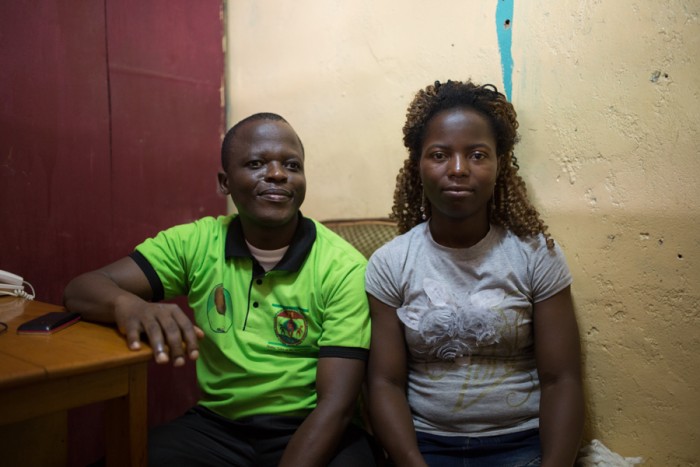April 30th, 2016 by Rachel | Tags: Disability, Peace Corps, Persons with Disabilities of Cameroon, Photography | No Comments »
During the last seven months of my Peace Corps service, I am featuring photographs and stories of several persons with disabilities living in Cameroon. All the photos are part of a series called “Persons with Disabilities of Cameroon.” The goal of presenting photographs and their stories is to create better awareness about the plights that persons with disabilities face in a developing country. When I return to the US, I hope to exhibit this series in a gallery and publish a book to educate others about persons with disabilities living in developing countries as this topic is so rarely discussed in the media.

Anywhere in the world, whether it’s in the US or in Cameroon, when marrying a person with disability, there is often a stigma. Family members and friends of a spouse who is in a relationship with a person with disability will often ask why he or she is marrying the one. The spouse who marries a person with disability always say that they just simply love the person. The spouse looks beyond the disability and see for who the person is inside the body.
Samuel who is married to a lovely lady and is president of Coordinating Unit of Association for Persons with Disabilities (CUAPWD), was ten years old when he noticed he was going blind and then he became completely blind at the age of 14 years due to Onchocerciasis. When he was going blind, he said, “I was developing coping mechanism. My family did not know what to do with me.”
When I asked him how did he transition from being able to see to becoming blind, he said, “I was at home for two years doing nothing.” He did also say that he did drop out of secondary school.
He then eventually started learning how to do various new tasks. “I started my hands on trying a few activities like cracking stones, filling bags for the nursing of plants with soil, selling small things, and pig farming. And then I later got rehabilitated in cane weaving,” he said.
He also then eventually got married. He and his wife, Nicoline, both grew up in the same village, Kedjom Keku, but they met in Bamenda. At the time, Samuel was living and working in Bamenda, and Nicoline who was still living in Kedjom Keku, was visiting her sister who was Samuel’s neighbor. “When she came, I realize she was hardworking and talked about my intentions to her sister because Nicoline was so shy in approaching. Through the sister, we arranged for a meeting and then had the opportunity of telling her my intentions of spending my life with her. It was difficult for her to accept,” said Samuel.
I asked Samuel, “Was it difficult for her to accepted because of your blindness?”
He replied, “Of course.”
“After talking talking with family members and some friends, we were to persuade her to accept my proposal,” said Samuel.
“What helped ease her fears about your disability?” I asked.
“One of the things that helped was that she saw me working, and she saw me doing household chores and take care of my brothers and sisters,” he replied.
“Why did you accept to marry Samuel?” I asked Nicoline.
“I decided to marry him because I love him,” she said.
She faced resistance from her family because she was marrying someone with visual impairment. Her mother and some of the aunts and sisters mocked her. Samuel’s neighbors helped calm her family’s fears by explaining that he’s hardworking and responsible, and they told stories about him.
“She asked one important question to friends and family members and the question was if she gets married to someone without disability and the person acquired disability within the marriage, what would they advise her to do?” said Samuel.
“What was their response?” I asked.
“It got them to reflect. And she told them it’s better to get married to somebody who have a disability and has accepted and is able to cooperate than someone who acquired disability in a later age. And she reminded them that all of them are temporary able and no one knows what will happen next,” he said.
When I asked what challenges they face in their relationship, Samuel said, “There are no particular. We make it work. We are making it work but there are external challenges. Some people still mock her for marrying me, and they call her ‘the wife of blind man.’ Some people even think she’s exploiting me.”
Shortly after Samuel married Nicoline in 1998, he started an organization called Hope Social Union for the Visually Impaired in 2003. He said he started the organization “to restore hope to visually impaired based on my experience and exploit.” Then, he founded the CUAPWD in 2005. Samuel shared interesting reasons why he started CUAPWD: “When I was president of Hope Social Union for the Visual Impaired, I realize there was negative competition among associations and leaders, and there was exploitations of persons with disabilities. So that’s why the Coordinating Unit was formed. The Coordinating Unit of Association for Persons with Disabilities was established to create a platform for a dialogue among leaders and associations for us to be able to compliment each other and direct resources credibly to all persons with disabilities both in urban and rural communities so that they can have a voice to promote the rights for an inclusive society for all. “






